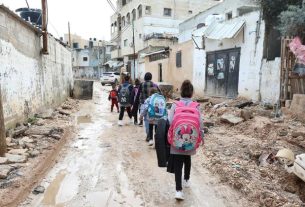A United Nations Human Rights Council panel on May 15 shed light on the crisis of human rights violations against migrants at borders worldwide. At the session, survivors and civil society representatives presented harrowing testimonies, emphasizing the need for greater action to prevent abuses and ensure accountability.
The UN Special Rapporteur on the human rights of migrants stressed the importance of justice and accountability and called for an independent monitoring mechanism at and around borders, echoing similar calls previously made by the UN High Commissioner for Human Rights and a global coalition of civil society groups.
Human Rights Watch has documented serious rights abuses against migrants along borders around the world. In the last few years alone, we have seen mass rights violations along routes in Latin America, the Mediterranean Sea, and the Saudi-Yemen border.
At the panel, Human Rights Watch and Médecins Sans Frontières (MSF) highlighted rights violations taking place along the Darien Gap, a jungle between Colombia and Panama transited by hundreds of thousands of people every year. Our recent report documented severe abuses along this route, including sexual violence. Dozens, if not hundreds of people have gone missing during this dangerous crossing. These abuses go largely uninvestigated by Colombian and Panamanian authorities, and accountability is rare.
Nearly a year ago, over 600 people drowned when a boat carrying migrants sank off the coast of Pylos, Greece. There is no accountability in sight: the Greek Naval Court’s investigation into the responsibility of the Greek Coast Guard has made little progress. The Court should advance its investigations promptly, effectively, and impartially to provide truth and justice to survivors and the families of victims.
Another shocking example is the mass killing of up to thousands of Ethiopian migrants and asylum seekers by Saudi border guards, who used explosive weapons or shot at them as they attempted to cross the Saudi-Yemen border. People we interviewed described shocking scenes: killing fields, with dead and dismembered bodies strewn across the mountainous landscape. Ethiopia and Saudi Arabian authorities have promised investigations but to date have provided no further information.
To ensure proper investigation into these crimes and other abuses at borders, and to help prompt justice for victims, the UN Human Rights Council should create an independent monitoring mechanism without delay.



